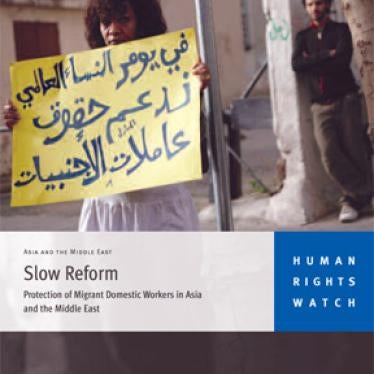(Dhaka) - Ministers from Asian labor-sending countries meeting in Dhaka this week should together endorse protections for migrant workers, Human Rights Watch, Migrant Forum in Asia, and CARAM Asia said in a briefing paper released today. They should give priority to protecting migrant domestic workers, who are at especially high risk of abuse, and to ending recruitment-related exploitation, the organizations said.
On April 19 to 21, 2011, Bangladesh will host the fourth round of the "Colombo Process," a series of regional consultative meetings on Asian contractual migrant workers. Under the theme "Migration with Dignity," delegates from 11 Asian countries that send large numbers of workers abroad will discuss strategies to improve coordination, optimize benefits from migration, and prevent abuses at home and abroad. Several labor-receiving countries from Asia and the Middle East will attend as observers.
"Abuses against migrants are often linked to gaps in information, poor coordination, and competition for jobs, so it's a big deal for these governments to sit around the table and address these problems together," said Nisha Varia, senior women's rights researcher at Human Rights Watch. "The Dhaka meeting is also a chance to share information about successful reforms with other countries in the region."
The briefing paper, "Protecting Asian Migrants' Rights: Recommendations to Governments of the Colombo Process," urges delegates to pledge support for a proposed international convention on labor standards for domestic work, increase civil society participation in future regional dialogues, promote increased multilateral cooperation, and take measures to eliminate recruitment fees charged to migrant workers.
"We are encouraged that governments are reviving the Colombo Process, but migrant voices also belong at the table," said William Gois, coordinator for Migrant Forum in Asia, a regional network of 200 groups committed to protecting migrants' rights. "As the organizations and trade unions representing migrants, we would like to have greater access to the meetings and expanded opportunities to participate in the discussions."
Some 3 million Asian men and women migrate each year, a large proportion working in domestic service, construction, manufacturing, and agriculture in other Asian countries and the Gulf states. Migrant workers play a key economic role - they fill labor demands in host countries and in 2010, Asian migrants sent home an estimated US$175 billion in remittances. Gulf countries in particular rely heavily on Asian contract labor; for example, there is approximately one migrant domestic worker for every two Kuwaiti citizens. Migrants from Bangladesh, India, Pakistan, and Sri Lanka have fueled construction booms in Saudi Arabia, the United Arab Emirates, and Bahrain.
But inadequate protections mean migrants also risk an array of abuses, the groups said, including recruitment-related deception and debts, unpaid wages, hazardous working conditions, physical and sexual abuse, and forced labor, including human trafficking. Unlicensed recruiters often operate with impunity, migrants have limited information about their rights and channels to seek help, and immigration policies can trap workers with abusive employers.
"When high, and often inflated, recruitment fees leave migrants heavily indebted, they are especially vulnerable to abuse," said Dr. Chowdhury Abrar, chairman of the international relations department at the University of Dhaka. "Cracking down on excessive fees and unethical recruitment practices will be a key ingredient to any reform."
Asian and Middle Eastern governments have introduced incremental reforms in recent years, and this year's forum will provide an opportunity to share best practices. While some countries have improved oversight of labor migration through bilateral agreements, uneven bargaining power between sending and receiving countries has meant that the resulting agreements are often weak. Such negotiations may also have unintended consequences, the groups said. When Indonesia froze migration of domestic workers to Malaysia in 2009 until a more protective Memorandum of Understanding could be concluded, recruiters from Malaysia turned to Cambodian workers instead.
"Even though migrants from Asia confront similar abuses while working abroad, their governments have typically addressed these bilaterally, and the results have been far weaker protections than if they negotiated together," said Mohammad Harun Al Rashid, regional coordinator for CARAM Asia.
In the wake of the departure of large numbers of migrants from Libya due to the armed conflict, governments at the Colombo Process meeting also plan to discuss coordinated responses to such emergency situations. Many Bangladeshi migrants were stranded in Egypt and Tunisia and had little means of returning home.
The International Organization for Migration provides technical support to the Colombo Process and serves as its secretariat. The labor-sending countries attending the Colombo Process include Afghanistan, Bangladesh, China, India, Indonesia, Nepal, Pakistan, the Philippines, Sri Lanka, Thailand, and Vietnam. Eight observer members represent countries of employment: Bahrain, Italy, Kuwait, Malaysia, Qatar, South Korea, Saudi Arabia, and the United Arab Emirates.The previous three regional consultations took place in Colombo, Sri Lanka (2003), Manila, the Philippines (2004), and Bali, Indonesia (2005). In 2008, the United Arab Emirates was host for a meeting that brought together governments from the Colombo Process, Gulf Cooperation Council countries, Yemen, Singapore, and Malaysia.







